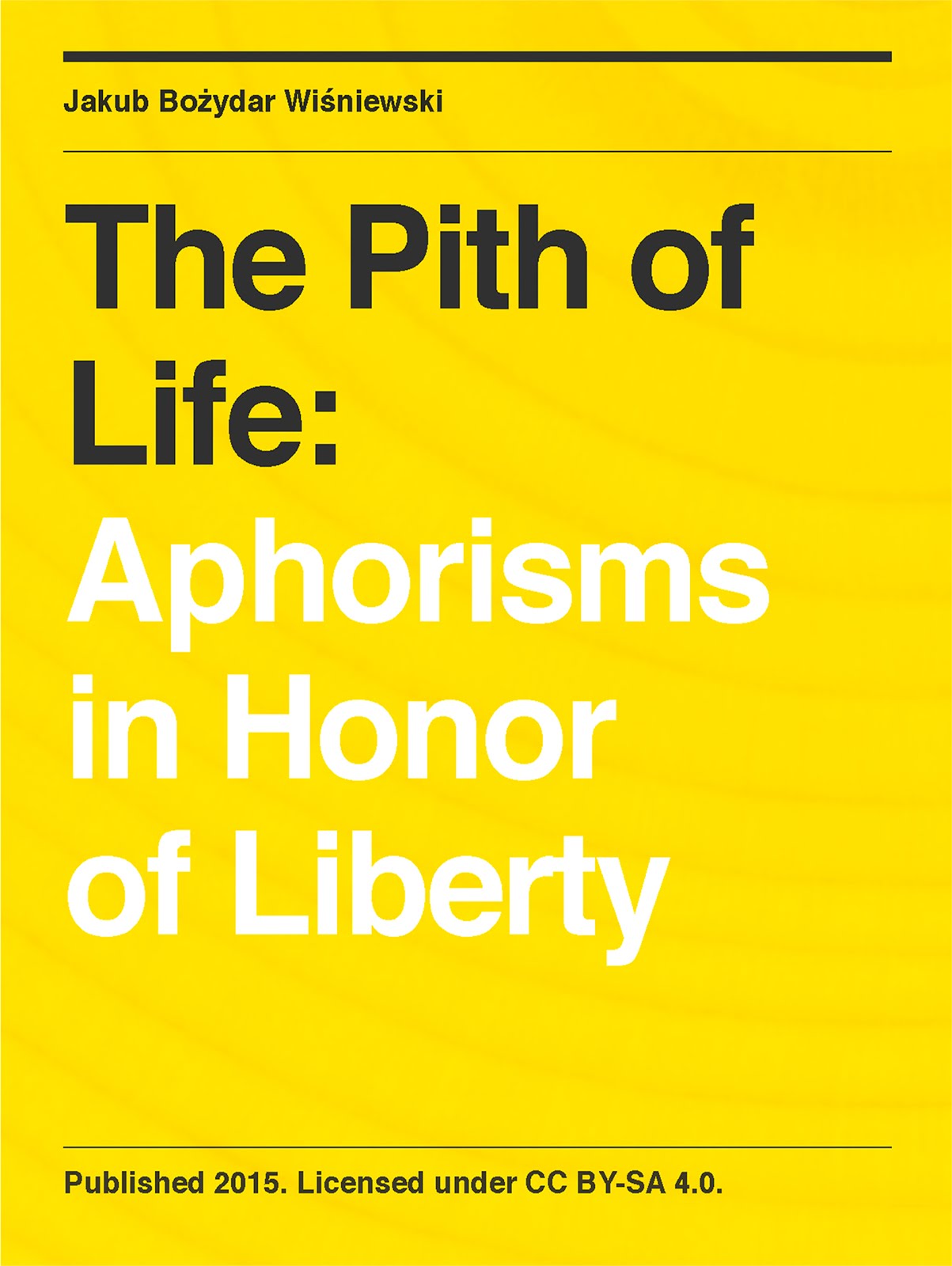Monday, July 25, 2011
Let Aggressors Have All The Guns
It is only a matter of time until politicians of all stripes start using the recent attacks in Norway as a pretext for clamoring for an even more thoroughgoing coercive disarmament of the societies of the world. Let us leave aside the standard question that suggests itself in this context, namely, whether we should be more afraid of the so-called "private criminals" or of the institutional monopolies of violence, entities responsible for some 200 million civilian deaths in the 20th century alone. Let us ask a simpler question: how many of the victims of the Norwegian killer would still be alive if any of them (let alone many of them) were equipped with a gun?
Wednesday, July 20, 2011
The Machiavellian Dictionary
The following list illustrates the curious phenomenon of a single concept assuming different verbal forms depending on the context to which it is applied - in this case that of the private sphere on the one hand and the state sphere on the other hand.
Private realm | State realm
---------------------------------
Anarchy | International relations
Animal spirits | Rational policy-making
Assault | Intervention
Blackmail | Deterrence
Coercive monopoly | Exclusive authority
Collusion | Bipartisanship
Consumerism | Fiscal activism
Counterfeiting of money | Liquidity provision
Cronyism | Public–private partnership
Debasement of money | Quantitative easing
Dissipation of assets | National debt default
Envious resentment | Passion for social justice
Expropriation | Eminent domain
Favouritism | Affirmative action
Fencing | Redistribution
Financial fraud | Creative accounting
Financial prudence | Choking aggregate demand
Frugality | Austerity
Gang war | Politics
Herding | Collective action
Hidden unemployment | Public works
Indoctrination | Public education
Intimidation | Reprimand
Kidnapping | Conscription
Murder | Death penalty
Mob law | Positive legislation
Mob rule | Democracy
Molestation | Security control
Monopolization | Coalition building
Money laundering | Foreign aid
Obstruction | Regulation
Parasite | Benefit recipient
Pillage brokering | Political campaigning
Ponzi scheme | Social security
Profit-seeking | Public service
Profligacy | Stimulus spending
Protection racket | National defense
Robber baron | Party donor
Ruthlessness | Resoluteness
Scam artist | Politician
Selfish desire | Public necessity
Self-partiality | Judicial independence
Self-serving rationalization | Public interest
Slavery | Political obligation
Special privilege | Protection
Stockholm syndrome | Civil allegiance
Terrorist organization | Intelligence agency
Theft | Taxation
Transgression | Emergency measure
Venality | Pragmatism
Private realm | State realm
---------------------------------
Anarchy | International relations
Animal spirits | Rational policy-making
Assault | Intervention
Blackmail | Deterrence
Coercive monopoly | Exclusive authority
Collusion | Bipartisanship
Consumerism | Fiscal activism
Counterfeiting of money | Liquidity provision
Cronyism | Public–private partnership
Debasement of money | Quantitative easing
Dissipation of assets | National debt default
Envious resentment | Passion for social justice
Expropriation | Eminent domain
Favouritism | Affirmative action
Fencing | Redistribution
Financial fraud | Creative accounting
Financial prudence | Choking aggregate demand
Frugality | Austerity
Gang war | Politics
Herding | Collective action
Hidden unemployment | Public works
Indoctrination | Public education
Intimidation | Reprimand
Kidnapping | Conscription
Murder | Death penalty
Mob law | Positive legislation
Mob rule | Democracy
Molestation | Security control
Monopolization | Coalition building
Money laundering | Foreign aid
Obstruction | Regulation
Parasite | Benefit recipient
Pillage brokering | Political campaigning
Ponzi scheme | Social security
Profit-seeking | Public service
Profligacy | Stimulus spending
Protection racket | National defense
Robber baron | Party donor
Ruthlessness | Resoluteness
Scam artist | Politician
Selfish desire | Public necessity
Self-partiality | Judicial independence
Self-serving rationalization | Public interest
Slavery | Political obligation
Special privilege | Protection
Stockholm syndrome | Civil allegiance
Terrorist organization | Intelligence agency
Theft | Taxation
Transgression | Emergency measure
Venality | Pragmatism
Labels:
doublethink,
hypocrisy,
machiavellianism,
statism,
stockholm syndrome
Monday, July 11, 2011
An Analogy for Consideration
If the prevalence of trashy literature and music is to be an indicator of the fact that there is an inverse relationship between the popularity of a given cultural product and its objective aesthetic value, then what should the popularity of Keynesianism in economics, postmodernism in philosophy, and "political correctness" in academia in general tell us regarding the objective intellectual value of these "scholarly products"?
Wednesday, July 6, 2011
Three Popular Expressions I Would Recommend Not Using
Price mechanism - This phrase suggests that the uniform, monetary scale of exchange values expressible in cardinal terms, to which all goods and services can be reduced and which allows for determining the extent to which any given entrepreneur acts in line with consumer sovereignty, is not the outcome of the totality of voluntary choices made by the totality of people wishing to satisfy their wants in a cooperative, contractual manner, but the result of some automatic, deterministically or probabilistically predictable movements and reactions, which can be mechanically constructed or corrected and "scientifically" improved. "Price system" seems to me to be the preferred replacement here.
The game of supply and demand - The word "game" is much abused in the context of discussing market interactions, while being completely inapplicable to it. The everlasting entrepreneurial effort to satisfy consumer wants is no game. "One cannot play speculation and investment. The speculators and investors expose their own wealth, their own destiny. This fact makes them responsible to the consumers, the ultimate bosses of the capitalist economy. If one relieves them of this responsibility, one deprives them of their very character." (Human Action, p. 705)
Spontaneous order - This is probably the most controversial position on this short list. However, I believe that the way in which Hayek imported the term in question from the biological context and used it in his writings generated a fair share of unnecessary confusion. To be more specific, it is suggestive of the notion that the social division of labor, the progressive accumulation of capital, the price system, the legal system protecting property rights, etc., are results of blind, undirected, undesigned evolutionary processes, from which the defining elements of human action are wholly expurgated (I do not claim that this is consistent with Hayek's own thinking on the topic, but this seems to me to be the usual interpretation of it). And yet, while these phenomena are certainly undesigned on the macro level, it cannot be overstressed that on the micro level they are outcomes of the dynamic interaction of innumerably many individual plans and designs of the totality of market participants. Thus, I would recommend dropping the phrase "spontaneous order" in favor of Menger's "organic order" ("organic" as in "of or characterized by the coordination of integral parts").
The game of supply and demand - The word "game" is much abused in the context of discussing market interactions, while being completely inapplicable to it. The everlasting entrepreneurial effort to satisfy consumer wants is no game. "One cannot play speculation and investment. The speculators and investors expose their own wealth, their own destiny. This fact makes them responsible to the consumers, the ultimate bosses of the capitalist economy. If one relieves them of this responsibility, one deprives them of their very character." (Human Action, p. 705)
Spontaneous order - This is probably the most controversial position on this short list. However, I believe that the way in which Hayek imported the term in question from the biological context and used it in his writings generated a fair share of unnecessary confusion. To be more specific, it is suggestive of the notion that the social division of labor, the progressive accumulation of capital, the price system, the legal system protecting property rights, etc., are results of blind, undirected, undesigned evolutionary processes, from which the defining elements of human action are wholly expurgated (I do not claim that this is consistent with Hayek's own thinking on the topic, but this seems to me to be the usual interpretation of it). And yet, while these phenomena are certainly undesigned on the macro level, it cannot be overstressed that on the micro level they are outcomes of the dynamic interaction of innumerably many individual plans and designs of the totality of market participants. Thus, I would recommend dropping the phrase "spontaneous order" in favor of Menger's "organic order" ("organic" as in "of or characterized by the coordination of integral parts").
Friday, July 1, 2011
Coase as a Proto-Dehomogenizer?
"Quite apart from the malallocations which are the result of political pressures, an administrative agency which attempts to perform the function normally carried out by the pricing mechanism operates under two handicaps. First of all, it lacks the precise monetary measure of benefit and cost provided by the market. Second, it cannot, by the nature of things, be in possession of all the relevant information possessed by the managers of every business which uses or might use radio frequencies, to say nothing of the preferences of consumers for the various goods and services in the production of which radio frequencies could be used." - R. H. Coase, The Federal Communications Commission, 2 J LAW & ECON 1 (1959), p. 18.
The title of this post is of course tongue-in-cheek, but it is still interesting to come across what seems to be a prominent Chicagoan's appreciation of the fact that Mises's and Hayek's arguments against central planning are complementary, but different (not to mention the fact that they are both clearly distinguished from the public-choice-style agency problems).
The title of this post is of course tongue-in-cheek, but it is still interesting to come across what seems to be a prominent Chicagoan's appreciation of the fact that Mises's and Hayek's arguments against central planning are complementary, but different (not to mention the fact that they are both clearly distinguished from the public-choice-style agency problems).
Subscribe to:
Posts (Atom)


